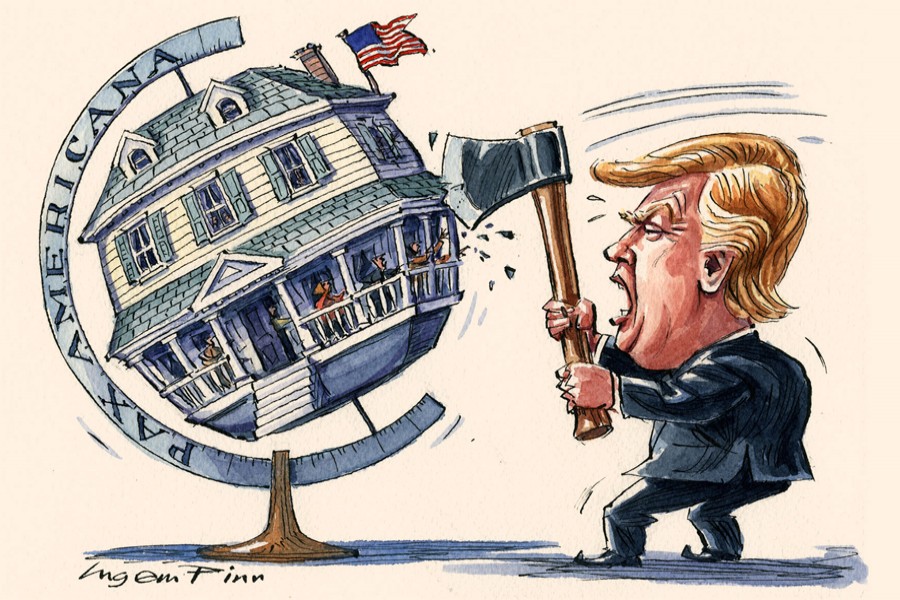
Published :
Updated :

The Finnish capital of Helsinki has made a good name for itself over the years. Having border with the Russian Federation, Finland was able to host several summits between the democratically-elected leaders of the West, including the United States, and communist-aligned Soviet Union during the cold war. In the past, US President Ford and Soviet President Leonid Brezhnev gathered in Helsinki along with 35 European heads of state to sign the Helsinki accords on security and cooperation. Similarly, US President Bill Clinton and Soviet President Boris Yeltsin attended the Helsinki summit on March 20, 1997 to discuss the NATO expansion. On July 16, US President Donald Trump and Russian President Vladimir Putin held summit in Helsinki without having any specific agenda.
It is really incomprehensible to note that the President of the US, a superpower after the cold war era, is subject to severe criticism at home and abroad for debatable actions. Since assuming the presidency, Mr Trump began criticising the closest US allies for trade deals, including the NAFTA (North Atlantic Free Trade Agreement) that was signed during the regime of President Bill Clinton. NAFTA was signed between the US and its next-door neighbours Canada and Mexico. But Mr Trump discarded the agreement and proposed to re-negotiate the trade deal. The US President, who is anti-immigration proponent, proposed to build wall along the US-Mexico border to stop entry of illegal immigrants through the porous border.
As a political scientist, I think the chemistry between Trump and Putin, a former KGB chief-turned-President who got trained on psychological warfare, is that both of them are on the same track. This has been reflected time and again in their viewpoints on issues like NATO and European Union. Similarly, both leaders are against the free press.
Never before in the history, both the leaders of Russia and the US were greeted in Helsinki by huge protest demonstrations on their arrival. Their summit was also marked by display from airport to the summit venue (presidential palace) of as many as 300 billboards drawing attention to their strained relations with news media. Taking an apparent swipe at President Trump, who walked away from the Paris international climate change agreement, two large banners read: warm your hearts, not our planet. The Trump-Putin summit took place following indictment of 12 Russian military intelligence officers on July 13 for hacking e-mails from the computer of Democratic National Committee, including that of presidential nominee Hillary Clinton.
Back at home, President Trump is under severe criticism for not defending the US intelligence community for meddling in 2016 presidential polls. Instead, Mr Trump condemned federal expensive investigation of Russian interference as "a disaster for USA and a total witch hunt." For the first time, Speaker of the House of Representatives Paul Ryan did not agree with the President's comments at a press conference following tete-a-tete with Mr Putin. The Speaker said, "there was no question that Russia interfered in the US election and continued to attempt to undermine democracy here and around the world". He thinks that Russia is not USA's ally and it remains hostile to the most basic values and ideals of USA while foreign relations committee chairman of the Senate Republican Senator Bob Corker is of the opinion that the US President gave a lot to President Putin.
He also urged his colleagues to come down heavily on President Trump's tariff authority thanks to which Mr Putin was further strengthened. A number of other Republican lawmakers, including Senator John McCain, criticised President Trump. The senator is on record to have said that the latest summit has been one of the most disgraceful performances by an American President in memory. The Washington Post quoted Director of National Intelligence Dan Coats as saying, "that the intelligence assessment of Russia's ongoing, pervasive efforts to undermine the US democracy has been clear and presented to Mr Trump in an unvarnished and objective fashion". Former CIA Director John Brennan said, "it was nothing short of treasons".
It's interesting enough to note that former President Barack Obama, who addressed a massive gathering to celebrate centennial birth of Nelson Mandela at Johannesburg in South Africa on July 17 denounced the policy of President Trump without mentioning his name. He, however, termed today's time 'strange and uncertain'. The politics of fear, resentment and retrenchment has began appearing and that kind of politics is now on the move at a pace unimaginable just a few years ago, Mr Obama added.
Both Mr Trump and Mr Putin are in favour of bilateral agreement instead of multilateral treaties like NATO or European Union. The era of Pax Americana is gone with the taking of office by President Trump and it has now entered a new and more dangerous stage of decline. The term Pax Americana is referred to the period when the concept of peace had been spread to Western Hemisphere and later in 20th century to the Western world as a result of preponderance of power enjoyed by the US. Such a trend gets evident in the policies followed by leaders like Russia's Vladimir Putin, China's Xi Jingpin, North Korea's Kim Jong-Un and Turkey's Recep Tayyep Erdogan. All of these leaders continue to criticise the democratically-elected leaders of Canada, United Kingdom and Germany. Probably, the leaders of western world are presently faced with a sort of nightmare-like experience and it may continue to remain much of the same unless President Trump changes his politics.
Mohammad Amjad Hossain, a retired diplomat from Bangladesh and former President of Nova chapter of Toastmaster International Club of America, writes from Virginia, USA.
amjad.21@gmail.com


 For all latest news, follow The Financial Express Google News channel.
For all latest news, follow The Financial Express Google News channel.